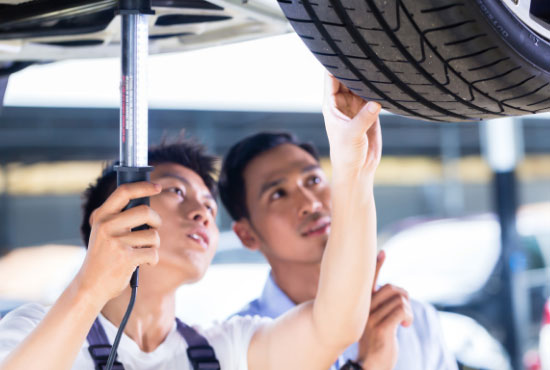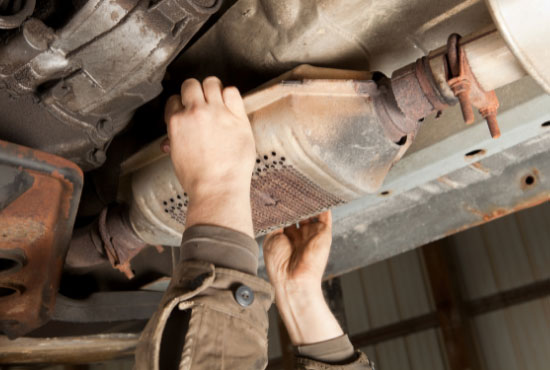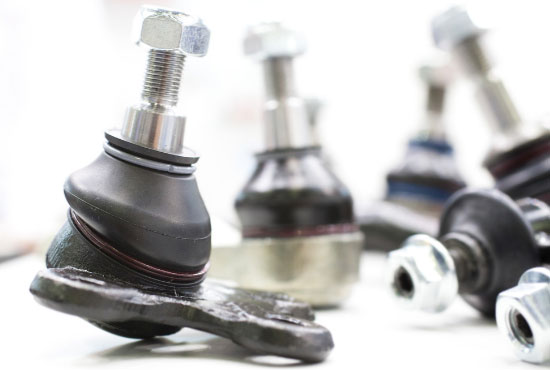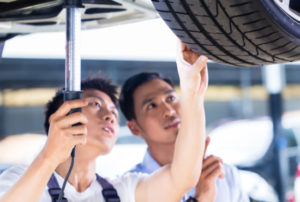I hear people all the time describing a clunking sound they hear being emitted from their 4-wheel drive. In order to know what caused the sound the vehicle has to be thoroughly checked over.
Most clunking sounds are actually caused by minor problems that can easily be corrected.
Identifying The Problem
The sound you hear may not mean that something is wrong with your vehicle. However, it always pays to check out every unusual sound. Ignoring noises like this can result in future problems.
What To Tell Your Mechanic

Before your mechanic can identify the clunking sound they have to know a few things more. Be prepared to answer a few questions so the mechanic knows where to start looking for the problem.
Some of the things you need to be able to tell the mechanic are:
- Where were you driving when you heard the noise. The details of the road surface was it dirt or rock, and whether you were going through water or mud are very important details.
- How fast were you traveling when you heard the noise. You may not remember the exact speed but you can estimate whether you were going 15 miles per hour or 50 miles per hour.
- Were you making a turn when you heard the noise?
- Have you heard the noise more than once?
- Was the 4-wheel drive engaged when you heard the sound or were you changing over to 4-wheel drive when you heard the sound?
- Have you noticed any slack in your steering wheel?
- Has the steering wheel been more difficult to turn?
- Have you noticed any grease or oily residue on the inside of the tires?
- Have you smelled any unusual odors?
- Have there been any other sounds like whining, grinding, growling, or knocking?
What Unusual Sounds May Mean
Traveling Too Fast When 4-Wheel Drive is Engaged
When you switch your vehicle into 4-wheel drive if you are traveling faster than the recommended speed you will cause a clunking sound. When you switch into 4-wheel drive the gears inside your transmission have to mesh together in order to lock your front and rear driveshafts together.
If you are doing off-road driving and switching into 4-wheel drive low your vehicle needs to be traveling at a speed no greater than five miles per hour. If you are traveling faster the gears have a hard time meshing and you can even tear up the 4-wheel drive.
Tires and Road Surfaces
The unusual noises you are hearing may be due to the tires on the vehicle and the road surface you are driving on. Most people who like to drive over off-road surfaces will have tires with an aggressive tread on them. These tires can go through mud and water, or they can go across gravel and debris and give you better traction.
The aggressive treads are not designed to be used on paved roads or hard-packed dirt roads. When you drive across hard surfaces these aggressive tires often make a lot of noises.
Catalytic Converter

Often the heat shield on a catalytic converter will get loose. Once it is loosened it rattles, clunks, and makes unusual noises. The bolts that hold the heat shield in place corrode over time and once corroded they break and let the shield flap and flop making noises to concern you.
Some people suggest removing the heat shield to stop the noise, but that is potentially a dangerous idea. Most people driving a Jeep are going to drive across dry leaves and grass. With the heat shield removed the heat from the catalytic converter could spark a fire.
The ceramic honeycomb inside the converter can also break and cause these noises. When the broken honeycomb is the culprit, you will hear the rattling and clunking the most when you are accelerating.
What To Do
Taking the time to clean the converter will reduce or eliminate the noise.
You can try running some of the highest grade fuel through your vehicle to help reduce or eliminate the noise problem. A couple of tanks of the higher octane fuel may be enough to clean out some of the soot and build up inside the converter.
Some people use lacquer thinner in a tank of gas to try and clean out their converters. You will need one gallon of lacquer thinner and about ten gallons of gas to do this.
Pour the lacquer thinner into the gas and then drive the vehicle. You are going to need to get the RPMs up to 2500 or better while you are driving, and you need to keep driving for about 150 miles. This length of time allows the lacquer thinner to work through your system and help eliminate problems.
If the honeycomb inside the converter is broken you can take a hammer or a rubber mallet and tap on the outside of the converter. While you are tapping listen for the sound or rattle. Once you identify the section of the converter that is rattling you can insert a screw into this area and quieten things back down.
This is a temporary fix. The screw goes through the outer layer of the converter and then it holds the rattling section of honeycomb in place. Eventually, you are going to have to have the converter replaced.
Bad Ball Joints

Your awful clunking noise may be nothing more than a ball joint that needs replacing. If the clunk you heard was your ball joint you can rest assured that you will continue to hear the noise until you replace the ball joint. As a matter of fact, the noise you heard is going to steadily worsen and get louder if it is your ball joints.
What To Do
The only solution for a bad ball joint is to replace the joint. This is not a really expensive repair and most people will get in and out of a shop for less than $300 dollars.
Your sway bar may be broken
If the sway bar under the vehicle breaks you may hear a clunking noise while you are driving. The sway bar is a preventive measure to help stop potential roll-over accidents.
If the sway bar is actually broken you may notice that the vehicle is harder to handle and does not respond quickly.
Frequently Asked Questions
How Long Does A Catalytic Converter Last?
These items should last the lifetime of your vehicle.
Can Ball Joints Cause A Clunking Sound?
Ball joints are one of the top ten reasons why you hear a clunking noise while driving.
Do Tie Rods Cause a Clunking Sound When Breaking?
There is a good possibility that when you hear a clunking while driving you are experiencing a tie rod end that is about to break.
Final Thoughts
Clunking, popping, clicking and grinding noises can actually be the result of several different vehicle components. Try to write down when you hear the noises, what you were doing at the time, and how often you hear the noises so you can actively search for the cause.
Related Jeep Articles
1. Will a Jeep Grill Insert Cause My Vehicle to Overheat?
2. How Far Can You Drive a Jeep If You Do Not Have The Key Fob?
3. Are Random Beeping Noises From My Jeep a Reason for Concern?
4. 4 Wheel Drive Grinding When Turning

